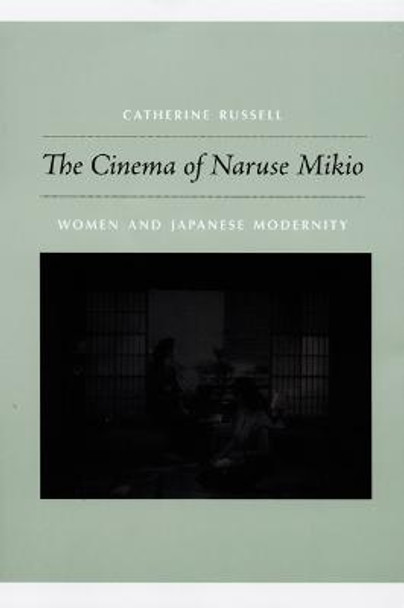Description
Naruse was a studio-based director, a company man renowned for bringing films in on budget and on time. During his long career, he directed movies in different styles of melodrama while displaying a remarkable continuity of tone. His films were based on a variety of Japanese literary sources and original scripts; almost all of them were set in contemporary Japan. Many were "women's films." They had female protagonists, and they depicted women's passions, disappointments, routines, and living conditions. While neither Naruse or his audiences identified themselves as "feminist," his films repeatedly foreground, if not challenge, the rigid gender norms of Japanese society. Given the complex historical and critical issues surrounding Naruse's cinema, a comprehensive study of the director demands an innovative and interdisciplinary approach. Russell draws on the critical reception of Naruse in Japan in addition to the cultural theories of Harry Harootunian, Miriam Hansen, and Walter Benjamin. She shows that Naruse's movies were key texts of Japanese modernity, both in the ways that they portrayed the changing roles of Japanese women in the public sphere and in their depiction of an urban, industrialized, mass-media-saturated society.
The first English-language book dedicated to an analysis of Naruse Mikio, one of Japan's most prolific directors
About the Author
Catherine Russell is Professor of Film Studies at Concordia University. She is the author of Experimental Ethnography: The Work of Film in the Age of Video, also published by Duke University Press, and Narrative Mortality: Death, Closure, and New Wave Cinemas.
Reviews
"The Cinema of Naruse Mikio presents not only a deft and subtle run-through of the world of an important auteur, but also a virtual encapsulation of the intellectual history of Japanese cinema during its most important period, the 1930s-60s. Catherine Russell contextualizes Naruse in the commercial situation in which he worked and in the historical, social, political, and intellectual project of mid-twentieth-century Japan. I came away firmly believing that Naruse was more attuned to how modernity was leaving its indelible marks on Japanese women than any other director of classical Japanese cinema. For students of feminist film criticism, Russell's book is an absolute must."-David Desser, author of Eros Plus Massacre: An Introduction to the Japanese New Wave Cinema
"A confluence of many forces produced the great (and stereotypical) triumvirate of Japanese cinema: Kurosawa/Mizoguchi/Ozu. However, even as these three took their positions at the forefront of auteurism, a fourth name was regularly invoked and too often ignored. Perhaps this was to be expected. Naruse Makio's films lacked period color for those searching for Oriental spectacle. Likewise, scholars celebrating formal inventiveness mistook Naruse's cinematic style for pedestrian convention. Those who looked at the director's films closely, however, knew that this was an extraordinary body of films and for a good many reasons. Catherine Russell looked closer than anyone, and has discovered a critical framework that provides us solid footing for exploring Naruse's modern world. Working meticulously through all sixty-seven extant films, Russell gradually reveals a director and team of technicians and actors exploring the contradictions, hopes, and disappointments of modern Japan-particularly for women, who participate in and contribute to modernity both on and off Naruse's screen. The Cinema of Naruse Mikio is a vivid and long-needed survey of the director's life work and the everyday landscape of twentieth-century Japan."-Abe Mark Nornes, author of Forest of Pressure: Ogawa Shinsuke and Postwar Japanese Documentary
"A confluence of many forces produced the great (and stereotypical) triumvirate of Japanese cinema: Kurosawa/Mizoguchi/Ozu. However, even as these three took their positions at the forefront of auteurism, a fourth name was regularly invoked and too often ignored. Perhaps this was to be expected. Naruse Makio's films lacked period color for those searching for Oriental spectacle. Likewise, scholars celebrating formal inventiveness mistook Naruse's cinematic style for pedestrian convention. Those who looked at the director's films closely, however, knew that this was an extraordinary body of films and for a good many reasons. Catherine Russell looked closer than anyone, and has discovered a critical framework that provides us solid footing for exploring Naruse's modern world. Working meticulously through all sixty-seven extant films, Russell gradually reveals a director and team of technicians and actors exploring the contradictions, hopes, and disappointments of modern Japan-particularly for women, who participate in and contribute to modernity both on and off Naruse's screen. The Cinema of Naruse Mikio is a vivid and long-needed survey of the director's life work and the everyday landscape of twentieth-century Japan."-Abe Mark Nornes, author of Forest of Pressure: Ogawa Shinsuke and Postwar Japanese Documentary
"Even for those who read Japanese and are familiar with Naruse Mikio's work, Catherine Russell's book contributes to a new understanding of his cinema. Russell shows how Naruse's films contributed to Japanese modernity as a cultural movement, and, using feminist film criticism and Miriam Hansen's influential concept of 'vernacular modernism,' she traces how his films illuminate female subjectivity throughout the studio era."-Daisuke Miyao, author of Sessue Hayakawa: Silent Cinema and Transnational Stardom
Book Information
ISBN 9780822343127
Author Catherine Russell
Format Paperback
Page Count 488
Imprint Duke University Press
Publisher Duke University Press
Weight(grams) 853g
Details
Subtitle: |
Women and Japanese Modernity |
Imprint: |
Duke University Press |









